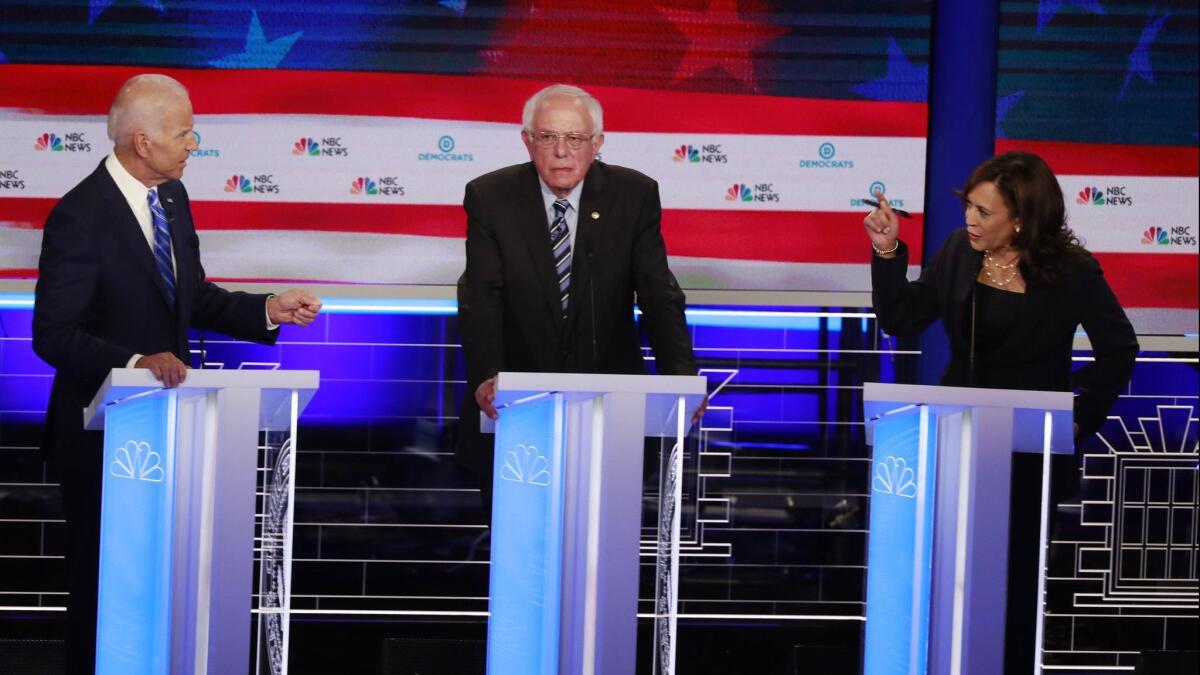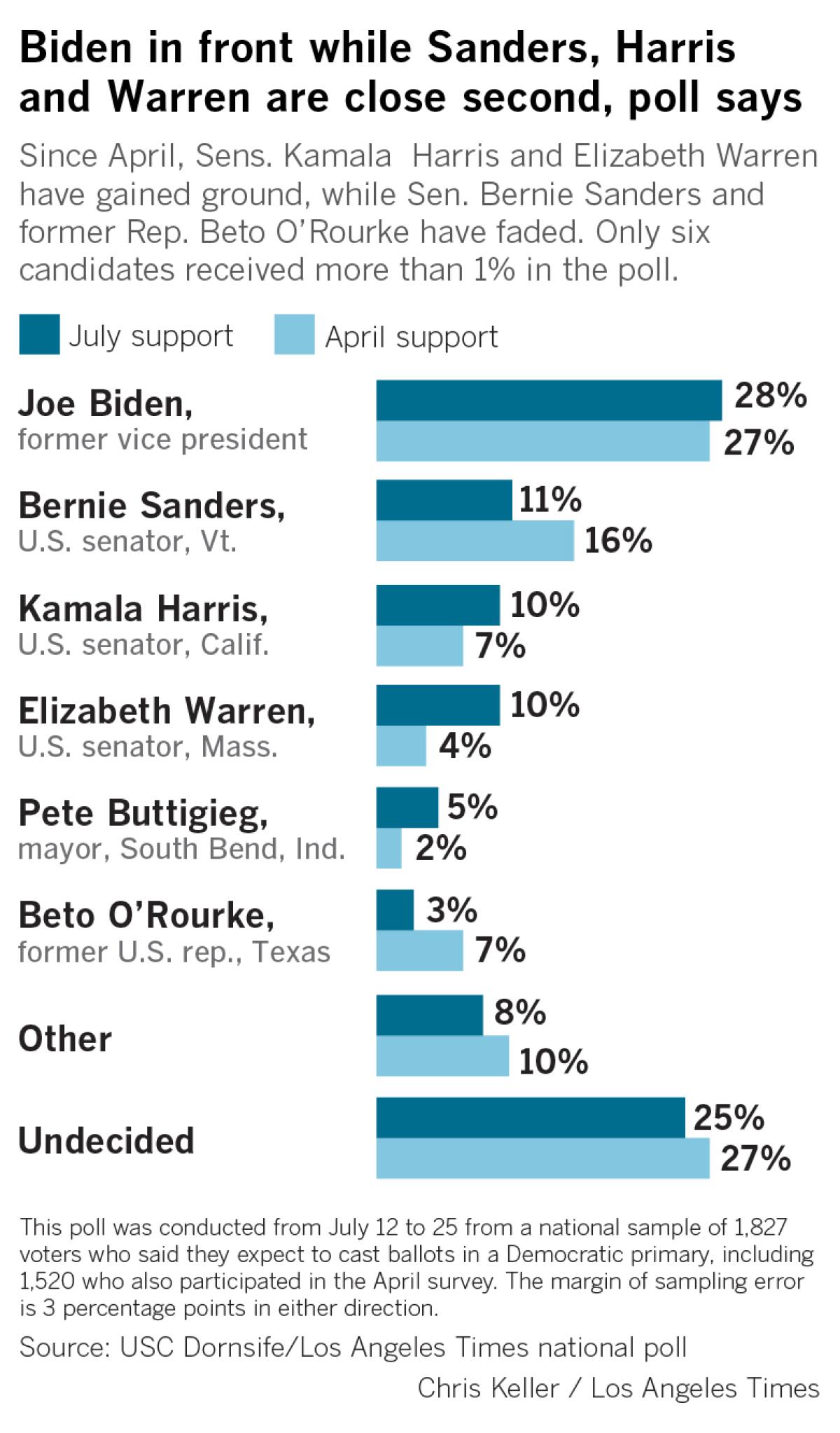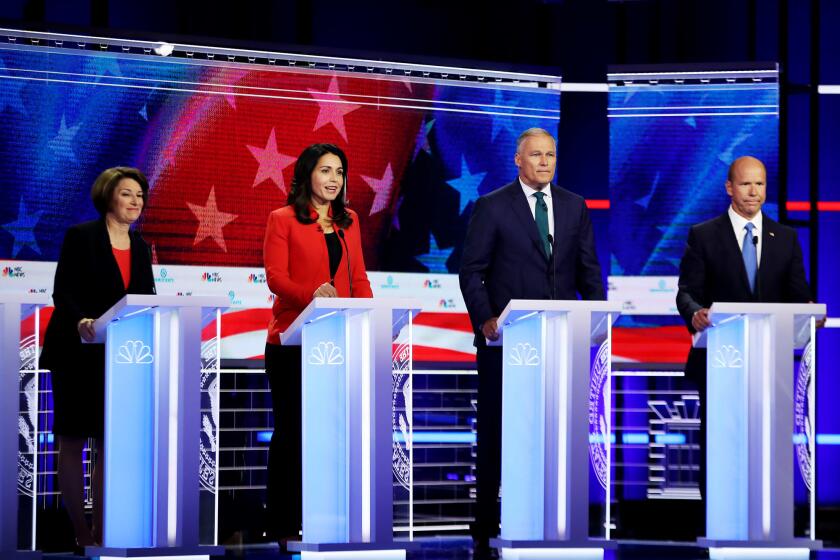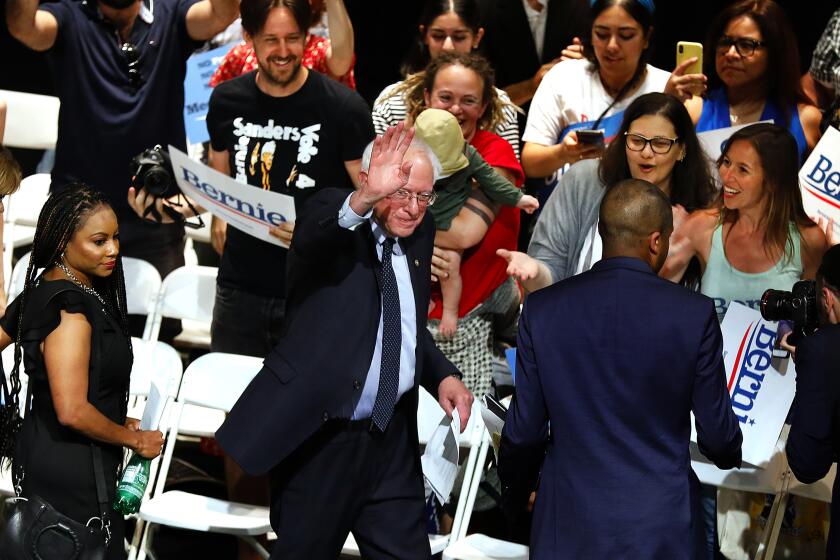Democratic 2020 race up for grabs: Half of voters have changed their minds since spring, poll shows

- Share via
WASHINGTON — As Democratic presidential hopefuls prepare for their second round of debates this week, a new poll finds that half of likely primary voters have changed their minds since the spring, highlighting how unsettled the contest remains.
Former Vice President Joe Biden continues to lead in the latest USC Dornsife/Los Angeles Times nationwide poll, while three senators, Kamala Harris of California, Elizabeth Warren of Massachusetts and Bernie Sanders of Vermont, are essentially tied for second place. That marks an improvement for Harris and Warren and a decline for Sanders since April, when the poll last tested the Democratic race.
More notably, about half of the voters in the poll have changed their preferences since the April survey — a reminder that at this point of the campaign, most voters don’t have firm commitments.
Voters at this stage of the campaign are “corks on the water floating around,” said Mike Murphy, the longtime Republican strategist who is co-director of USC Dornsife’s Center for the Political Future, one of the sponsors of the poll. That’s particularly true for voters nationwide, who have less exposure to the candidates than voters in states with early primaries.
The volatility has a limit, however. The vast majority of voters who switched since April moved among the top four candidates or between them and undecided status. The mass of candidates languishing at 1% or lower hasn’t benefited.
The strategies of several Democratic candidates are being powerfully shaped by the risk of failing to earn a spot in September’s candidate debate and possibly falling out of the race.
Biden continues to lead the poll, with 28%. Harris was at 10%, putting her in an effective tie with Warren, also at 10% and Sanders, at 11%. An additional 25% said they were undecided when presented with a list of 25 people who have declared they are running.

Beyond the top candidates, the poll found only Pete Buttigieg, the mayor of South Bend, Ind., and former Rep. Beto O’Rourke of Texas having more than 1% support. Buttigieg’s support has grown since April and now stands at 5%, while O’Rourke’s has shrunk to 3% -- all shifts within the poll’s margin of error.
“When your front-runner is at 28% and undecided is at 25%, it’s a pretty fluid race,” said Jill Darling, the poll director.
Unlike some other public opinion samples, the USC/L.A. Times poll surveys a panel of more than 7,000 members, tracking their views over time. Polls using the panel can look at how and when specific voters have changed their preferences.
In the primary contest so far, the first round of debates in June appears to have played a big role in changing minds. Harris, in particular, gained support among people who watched the debate, during which she forcefully challenged Biden over his nostalgia about working with segregationist senators early in his career. The exchange appears to have boosted Harris without doing long-term damage to Biden, who gained roughly as many supporters as he lost.
People who reported that they watched the debate -- about 3 in 10 of those who said they planned to vote in a Democratic primary -- were more likely to have switched than others. But even many voters who did not watch the debate changed their minds.
That churn has affected candidates in different ways. Biden and Sanders do best among voters who have backed the same candidate all along, while Harris and Warren, who each gained lots of new followers, do better among those who have changed their minds. About 7 in 10 of those backing Harris and 8 in 10 backing Warren were converts since April, the poll found.
Sanders sits at the opposite extreme — about 8 in 10 of those backing him now also backed him in April. That’s both a strength for him and a weakness.
The Vermont senator has a solid core of supporters, many of whom grew attached to him in 2016 when he ran against Hillary Clinton. One indication of that: He did best among the roughly 1 in 4 voters who neither watched the June debate nor heard or read about it.
Outside of his core support, Sanders has been losing backers, and unlike other candidates, he has picked up relatively few new ones. Almost half the supporters he had in April have moved elsewhere.
Sanders remains a leading contender for the 2020 nomination, but he’s no longer the political phenom he was four years ago, forcing him to fight to break from a crowded Democratic field.
About 1 in 10 former Sanders backers now say they’re undecided. Twice as many, however, now back Biden.
That’s a reminder of another important fact: Voters aren’t as ideological as analysts sometimes make them out to be.
Sanders has staked out the left-most position in the contest. Warren shares many of his policy views. Biden has defined himself as a centrist. But nearly three times as many former Sanders backers moved to Biden as moved to Warren.
Biden and Sanders both do better with non-college educated voters than with those who have graduated from college. Warren and Harris, by contrast, do better with voters who have college degrees.
A significant number of voters switched back and forth between Harris and Warren between April and July. Both senators also picked up a significant number of former Biden supporters and voters who had been undecided.
Warren and Harris also both do better with self-described liberals or progressives than with Democrats who call themselves moderate or conservative. Biden dominates among the moderates, who make up about one quarter of primary voters, and among older voters — key reasons he has continued to lead the race.
Biden has had the best record at holding onto his supporters, with about two-thirds of those who backed him in April remaining in his corner in July.
Another key factor for Biden is the widespread belief that he’s the Democrat with the best chance of beating President Trump.
Overall, asked to rate Trump’s chances for reelection on a zero to 100 scale, Democrats averaged just short of 40, indicating some confidence of victory, but far from belief that it’s a sure thing.
About 9 in 10 of Biden’s supporters said he was the most likely of the candidates to pull off a victory. But so did large shares of voters who backed other candidates. About a third of Sanders supporters, for example, said Biden was the most electable. So did nearly 4 in 10 Harris backers and about one-third of Warren’s. Overall, more than half of Democratic primary voter picked Biden as the most electable candidate.
That doesn’t mean they’re happy about the prospect, though. Only about 1 in 5 Democratic voters said they’d be “completely happy” if Biden won the presidency. Roughly twice as many offered a more tepid “mostly happy.” Even Biden’s supporters split closely on that question.
The electability argument “is Biden’s biggest advantage,” said Bob Shrum, the USC center’s other co-director.
But that’s also “why he’s at risk in the next debate,” Shrum said. After a poor debate performance last month, Shrum said, “if he face-plants again,” he could shake voters’ faith in his ability to take on Trump.
This USC Dornsife/Los Angeles Times poll was conducted from July 12-25 among 1,827 voters nationwide who said they expected to cast ballots in a Democratic primary, including 1,520 who also participated in the previous poll in April. The margin of error is 3 percentage points in either direction. Respondents were drawn from a probability-based panel maintained by USC’s Center for Economic and Social Research for its Understanding America Study. The poll was conducted in partnership with, and funded by, the USC Dornsife Center for the Political Future. Responses among all eligible voters were weighted to accurately reflect known demographics of the U.S. population.
A description of the methodology, poll questions and data, and additional information about the poll are posted on the USC website.
More to Read
Get the L.A. Times Politics newsletter
Deeply reported insights into legislation, politics and policy from Sacramento, Washington and beyond. In your inbox three times per week.
You may occasionally receive promotional content from the Los Angeles Times.













